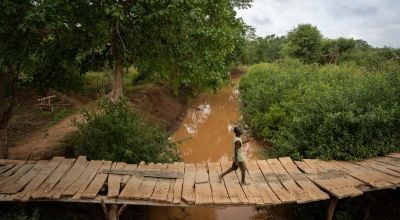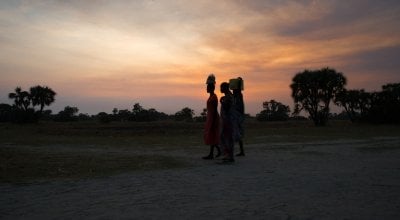
Read our 2024 annual report

Knowledge Hub
Love empowers: stories from around the world
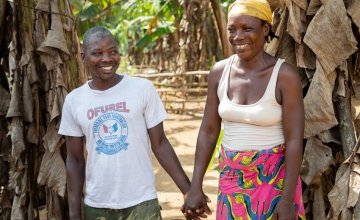
We hear about ‘the power of love’ all the time – in romantic movies and in the lyrics of aching love-songs. In our work with the world’s poorest people, we are lucky enough to see the empowering nature of love in some of the most challenging circumstances. We see how love, in all its forms, can inspire us to do better, and how it can lift us up in times of crisis.
Rebecca and Jeremiah
Rebecca and Joseph's relationship has withstood more than one lifetime's worth of heartache.
Rebecca has given birth to ten children in her lifetime. But six of those children died from malnutrition during Liberia’s civil war. For any couple to lose one child is devastating. Losing six children is unimaginable.
My children were swollen up from hunger and they died. There was no food during the war. It was so difficult to see my children die."
When the war ended Rebecca and Jeremiah travelled to the remote region of Rivercess and have lived there together with their youngest children for the last eight years.
Their life is still very difficult. Their young daughter Marconie is extremely ill and they are very worried about her.
But they still have each-other. And the support they are now receiving from Concern is helping to make their life that little bit easier. They own a small farm and have been able to benefit from the village water pump. Rebecca is also a member of the Mother and Baby group run by Concern, which offers advice on nutrition and hygiene to prevent illness.
Mohamed and Kadiatu
All relationships take hard work and commitment, and they all have obstacles to overcome. Gender inequalities within a relationship are one of the biggest and most common obstacles the world over.
We encounter these inequalities frequently in our work. Issues like women carrying the heavier burden of work, having less decision-making power and being subjected to violence in their homes – these all have a negative impact, not just on the women and girls who are directly affected, but also on their families and wider communities. So we aim to address these issues head-on in our programming.
Mohamed and Kadiatu are a married couple from Sierra Leone. Their relationship was rife with inequalities. Kadiatu did not feel respected or supported by her husband, carried a heavier burden of work and did not have a fair say in decision-making for the family.
But all of that changed when they took part in a series of workshops with Concern that are aimed at engaging men to empower women. The sessions offer a rare opportunity for both men and women to contemplate a different reality in terms of gender. One where roles are not fixed and are not assigned to ‘only men’ or ‘only women’.
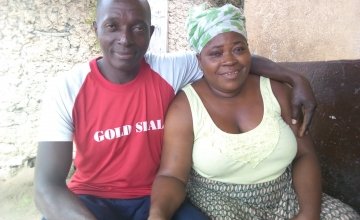
The results of these workshops were really transformative for Mohamed and Kadiatu. They opened up the possibility of a whole new way of living for Mohamed, one that would benefit the whole family.
Kadiatu says “One afternoon, my husband knelt down and said sorry for everything. He promised to implement what he had learned from the programme.”
Mohamed and Kadiatu’s marriage has not been plain sailing. But they have worked hard to improve their relationship, and the dividends are already starting to pay off.
I am really happy now that my home is peaceful. My husband treats me like a queen.”
Nyathuk and LarJar
Welcoming a new baby into the world can be a roller-coaster for any mother. It is a beautiful time, but is often a frightening time too. For young first-time mother Nyathuk, giving birth to her baby boy while she was displaced by war in South Sudan was particularly worrying.
Little LarJar was born in a Protection of Civilian site in Bentiu. Home to approximately 120,000 people displaced by war, it is a challenge for any mother to keep her their child healthy and well-nourished there. But Nyathuk faced an even bigger challenge when LarJar was born three months premature. He weighed only 1.3 kilograms.
I was very worried when he was born. He was very small and very weak.”
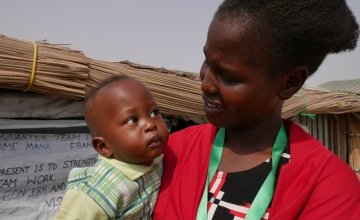
At first, LarJar was too small to even breastfeed. This was a major challenge for Nyathuk. She had to express her breast milk while LarJar was fed with formula. After two weeks, his weight increased to 1.5kg and he was able to switch to express milk. Nyathuk was delighted when a month or so later he had grown big enough to suckle.
From there on she exclusively breastfed her little boy until he reached six months.
Now 11 months old, LarJar is a bouncy baby boy, full of smiles and energy.
Ultimately, Nyathuk’s love for her son and her confidence and competence in nurturing him to full health from such a precarious start, has pushed her towards another new role. She went on to join Concern’s nutrition team. Now she helps to identify malnourished children living in Bentiu Protection of Civilian site and passes on to other mothers the same vital health and nutrition messages that she implemented so successfully.
With your support, love can conquer all
Love comes in all shapes and sizes. It’s never easy and it will always encounter challenges. But if people are given the right support, love really can conquer all.
Pledge your love this Valentine’s Day by making a donation to support our work.



